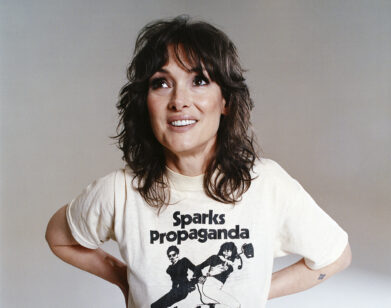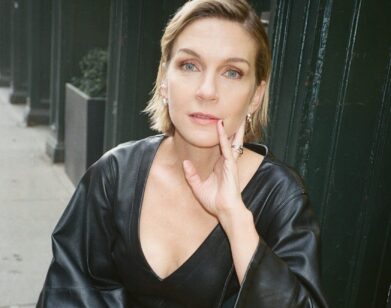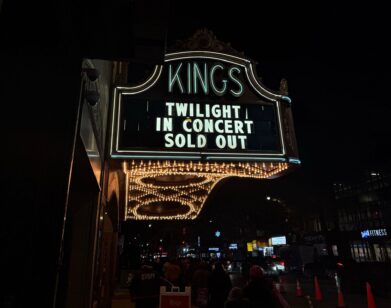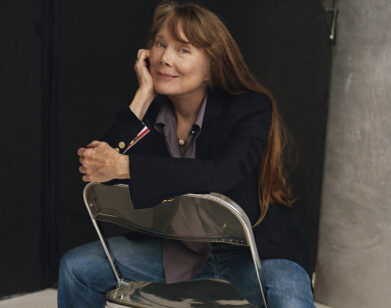Josh Radnor on Building an Onscreen Bildungsroman
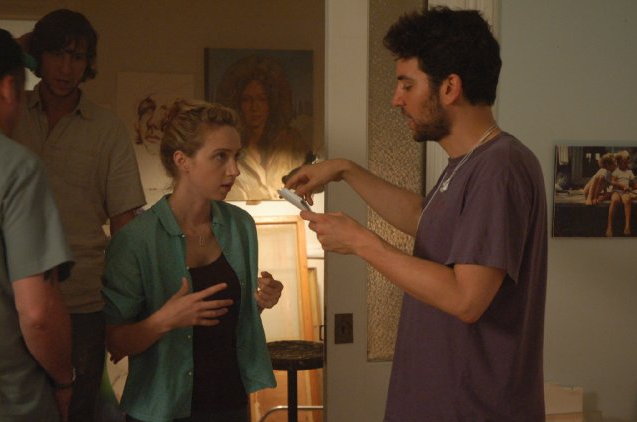
JOSH RADNOR (RIGHT) WITH ZOE KAZAN ON SET
PHOTO COURTESY OF ANCHOR BAY FILMS
Disarmed by his own reluctance to grow up, Sam, played by Josh Radnor in his directorial debut HappyThankYouMorePlease, is a twenty-something New Yorker whose “great shame as a writer is that [he’s] just this suburban kid with good parents.” Sound familiar? While the movie draws an inevitable slew of comparisons, its idealism—a rare quality that may not sit well with some audiences and critics—is what separates it from more traditional, misanthropic, coming-of-age stories. Even its soundtrack, scored by singer-songwriter Jaymay (who acts as HappyThankYou‘s troubadour), favors the sweeter sides of living in New York; like summer-night stoop sitting, the precarious but also thrilling prospect of running into an ex, or how effortlessly coincidence and much-needed reflection come about from simply walking and talking.
Joining Radnor’s Sam is a cast of characters who despite a few qualities and conversations that teeter on quirk—an offbeat turban-wearing friend with alopecia (played by Malin Ackerman), a stray foster-care kid whom Sam “adopts” for a few days, and a waitress and wannabe cabaret singer named, somewhat preciously, Mississippi (played by Kate Mara)—the performances are warm and often very funny. In particular, the relationship between Mary Catherine (Zoe Kazan) and Charlie (Pablo Schreiber)—a young couple whose life together is about to change—feels especially panicked and cluttered, and above all, crucial.
DURGA CHEW-BOSE: I saw HappyThankYouMorePlease almost a year ago at GenArt’s Film Festival…
JOSH RADNOR: At the Ziegfeld. I loved that screening!
CHEW-BOSE: The theater was packed, and everyone stayed for the Q&A, which doesn’t always happen. It’s been more than a year since your Sundance premiere and Audience Award win; what’s the wait been like?
RADNOR: Well, I don’t have anything to compare it to, it’s not like “Well, my other movies have all come out within however much time it takes to come out.” This is all new to me, so I’m just rolling with it.
CHEW-BOSE: HappyThankYou isn’t the most traditional rom-com, but it does have a lot of the same touches. What do you think attracts audiences to ensemble-cast romantic comedies, especially those set in New York?
RADNOR: I honestly don’t know that this is a proper romantic comedy. You’re right there’s elements of it, but it’s also, I don’t love this term, but it’s a coming-of-age kind of thing, you know people do grow up. The stuff I make, and I think this is both a strength and a liability in some ways, is kind of unclassifiable, in that I’m not writing straight up genre pieces. But I am always attracted to ensemble pieces because when they’re done well, they’re fun. It’s almost like a meal that’s one great dish versus a kind of buffet, like you can try a little of everything. And New York is a such a great town for movies because you walk out of your apartment and you’re just bombarded with people and their stories. And everyone’s story is, on some level, affecting somebody else’s story.
CHEW-BOSE: Yeah, riding the subway here, because I had just rewatched HappyThankYou, I caught myself hypersensitive to what was going on around me. The movie is almost entirely free of cynicism, which is rare to see in films, especially first films. Was that really important to you when you were writing and directing it?
RADNOR: Yeah, I mean, it kind of mirrored my own life: trying to scrub myself free of cynicism, which is a challenge because there’s so much supporting cynicism and conspiring to keep us all a little scared, and a little bit negative. And I always wondered, “What is that?” And I’m not much of a conspiracy theorist, like I don’t think there are men huddled in dark rooms being like, “We’re going to keep the people afraid and cynical.” I used to be a lot more of an ironic character… And I really find that when I’m looking across the pop-culture landscape, I’m always looking for things that look sincere and authentic to me. Because I think really caring about something is cool. And those are the people I’m really attracted to in my life, so I figured if I’m given the resources and time to make a movie, why not make one that’s really positive and cool, and makes people feel better about their lives, rather than, “You know what’s fucked up? Humanity.”
CHEW-BOSE: I was reading about the film’s production, and you mentioned that as a first-time director, your main goal was to be the “guardian of the tone.” Can you elaborate a bit about what that meant for you?
RADNOR: Well, I learned a lot from doing these readings with these actors over the course of a few years.
CHEW-BOSE: But not the final cast, right?
RADNOR: Yeah, the only person who ended up in the cast who had done a reading was Tony Hale. To me it’s like there was just this sweet spot, tonally, with the movie and if it got too broad or if you hit the jokes too hard, it became kind of goofy or sitcom-y in a way that I didn’t want. And then it could also become too melodramatic or sentimental.
CHEW-BOSE: Was there a moment during the shoot that stands out now, that felt particularly trying?
RADNOR: Well, I hired actors who could really “go there.” The climactic scene between Charlie and Mary Catherine, which is one of the scenes that I am really most proud of, I [told] Zoe to really work herself into a lather, but she was knew what was required. One of the producers came up to me and was concerned because he was watching it, and said, “It looks like she’s having a panic attack.” And I said, “That’s exactly what she’s having. That’s good, I’m happy that you think that.” But you know, there was some concern, that the emotions would be too operatic and too grand. I feel especially given the stakes of that story and what she fears, how could you go too big? I don’t want to spoil anything, but given what she’s going through and that she fears her boyfriend might leave her, I mean that’s as big a situation as one can go through. That’s a really big deal.
CHEW-BOSE: You wrote three different and dynamic female characters. And even though Sam is the protagonist, Zoe’s got some of the most memorable lines and moments. I was wondering if you could speak to, as a male writer writing female characters, some of the challenges?
RADNOR: I have really good female friends. I’ve never bought the whole men-and-women-can’t-be-friends thing. I think that’s sort of nonsense. And I’m kind of a female-oriented male in that I have two sisters, I don’t have any brothers, I was never in a fraternity because I always felt uncomfortable in a group of only guys.
And I think a lot of the time, not as much in this script, but in other things I write, there’s the guy dragging his knuckles and not kind of getting with it and the woman is a beat ahead. And I think that a lot about the women in my life. I based Malin’s character on a friend of mine, and I just have these really great female friends who are wise and smart, and funny, and insecure, and confident, and they’re just complicated human beings to me. A slice of life of the New York I know would be half a story if I didn’t include these women.
And the other thing is, I don’t want to sound too precious or anything, but something that concerns me is that women in Hollywood—Malin is a perfect example of someone who did all these big studio comedies and she was asked to either be sort of ridiculous or arm candy for the male leads. So I feel like Hollywood has an inability, I don’t know, they write very narrow and clichéd, and pretty offensive characters for women. It’s a big deal, because we both learn a lot and reinforce a lot about ourselves through the movies. I think women need to be the ones writing and directing more movies and I don’t know, men need to start spending more time with more complicated and interesting women. I hope that doesn’t sound too pious, but I do believe it. And I’m not a saint or anything. I just think that the alarm that women feel about how women are portrayed in film is totally well founded.
CHEW-BOSE: Did you read Tina Fey’s piece in The New Yorker?
RADNOR: I thought that was amazing! Incredible. What was that quote that, “they keep talking when nobody wants to fuck them anymore?”
CHEW-BOSE: Something along the lines of “crazy in show business” is a woman who keeps talking even when nobody wants to fuck her anymore. She said it better, of course. And before we wrap up, any films you’ve seen recently that really excited you?
RADNOR: You know what was really good? When I was at Maui Film Festival they pair a short film with a feature, and the short film paired with mine was God of Love. And it’s really charming and strange, and funny. So I was thrilled to see [Luke Matheny] win the Oscar.
CHEW-BOSE: Are you working on another script?
RADNOR: I am, but I’m superstitious, so I’ll just be evasive.
HAPPYTHANKYOUMOREPLEASE IS OUT IN THEATERS TODAY.

